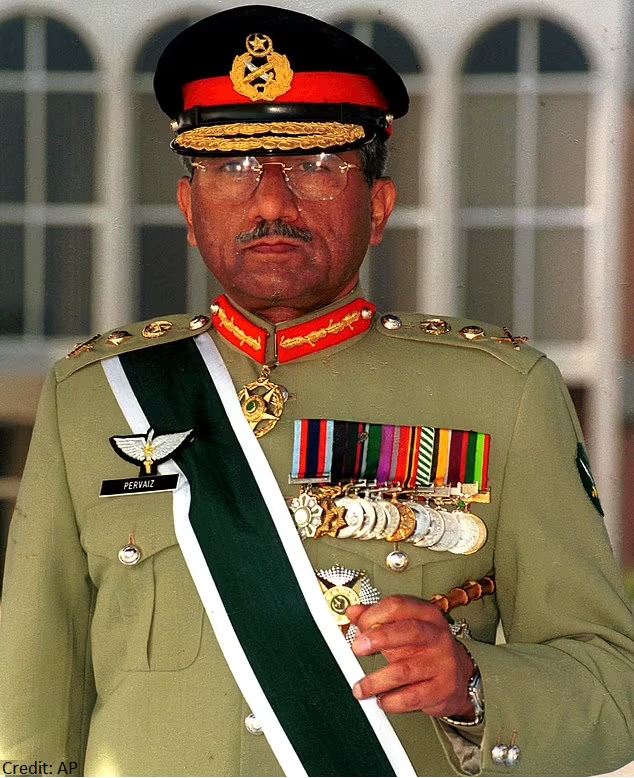The former Chief of Army Staff (COAS) and the 10th President of Pakistan died at the age of 79 from “amyloidosis” complications, left behind a legacy of extremes.
Musharraf, a soldier who came into power from the former PM Nawaz Sharif’s miscalculations, and who lost his power from his inapt calculus.
Sharif in a hasty decision appointed Lieutenant-General Ziauddin Butt as the new COAS, while Musharraf was in the air in return from Sri Lanka. Sharif’s blunder—he appointed LT. Gen. Ziauddin Butt from the Corps of Engineers with no army following, took command at the PM office and not in the GHQ, where he should have been.
Musharraf’s inapt calculus did not succumb to internal factor as it is claimed—the lawyers movement. If the lawyers were this powerful, why they are in total paralysis after the April 2022 Bajwa orchestrated regime change? Musharraf was out maneuvered by the doctrine of The War has Changed.
The international players have the ability to Change the War. Musharraf unaware that the war has changed tactics, does not re-calibrate his plans as the international order mines the elite of the country to bring about outcomes. Gen. Kayani played his role here. Musharraf was ousted in August 2008.
One of the troubling legacies’ aspect is leaving behind the inapt calculus. The inapt Calculi of predecessors serve as the metrics for the survival of the successors. To survive, it becomes clear to the successors given the baton is to run with an advantage. They ally with the international order and take on the default settings. They learn not to act in ways to become victims of The War has Changed doctrine.
It is quite telling then, why Musharraf gave National Reconciliation Order (NRO) to polity charged with crimes or were subject to criminal investigations, a pardon he regretted later, has become the modus operandi of Bajwa and the current COAS Asim Munir.
Patriotism of the Pakistan Army high ranking officers come in gradation, as in red to green. It would be difficult to portray Musharraf not as a patriot of the country. Musharraf missing the green mark is due to the fault line of Pakistan. Pakistanis have not developed civitas worthiness, explained here.
Musharraf’s scholastic caliber as not apt in the military and institutional matters is apparent from the tide of his management. A few examples come to mind.
Kargil Conflict hatched by the dream and the childish thought of a few to internationalizing the event was fought without support of logistics. In military terms without logistics is a non-starter. Brig. M. Hamid-Uddin in his book Looking Back, writes, “The planners of Kargil War should be court martialed.”
Musharraf on the institutional matters had upset the true and tested Malik (tribal respected administrator) management system with his Western norms—democracy. One other catastrophe—enlightened moderation.
Economic indicators are always stronger than civil democratic leadership. The foreign debt in Musharraf rule did not skyrocket as those in the Sharif and Zardari governments. Army rule in Pakistan usually benefits from the U.S. foreign policy—Soviet invasion of Afghanistan and Bush War on Terror.
Musharraf rose to power from crisis in democracy. Crises originate from differences in foreign policy. Once I asked a colleague of Musharraf about the bone of contention between Nawaz Sharif and Musharraf. It came to patriotism. Essentially, he pinned the deeds of Sharif to being a RAW agent. The country could not agree more with his views.
A viewpoint of submitting to RAW is a taboo, but Musharraf surrendering to the U.S. eleven demands after 9/11 in support of the President Bush’s slogan, “You are either with us or against us” is justifiable among those that made the decision in isolation. Pakistan paid dearly.
In his private life, Gen. Musharraf became the self-appointed spokesperson for Pakistan. The highlights include Musharraf’s argumentation. Embarrassing the West when he was questioned on ISI’s failure of not knowing the whereabouts of Bin Laden.
India saw a persona of a brave general. The Indian media took him on, only to find out he would not allow Indian coercion, and wittingly replied to the Indian point of view.
India’s media had psychological obsession with Musharraf because of Kargil. Gen. Musharraf, in his loss of Kargil conflict, had bloodied and defeated India’s psyche. If Kargil is India’s triumph, the triumph has recorded damages caused to the illusion of the mighty ‘invincible’ India.
Will the nation forgive Musharraf for pardoning the corrupt polity? For Allah is forgiving—it takes one act of goodness. Musharraf, I believe has done that—buying his country the last warm meal. It was his message from his hospital bed to Imran Khan around April 2022. Supporting him to fight and stand against the regime change.
This was a strong condemning voice of Musharraf against his fellow soldiers whom have taken up the path of war against their own country.
Mian Hameed
.

He was a good soldier who made some honest mistakes that is what makes us human. Excellent article and very balanced analysis of General Musraff era.